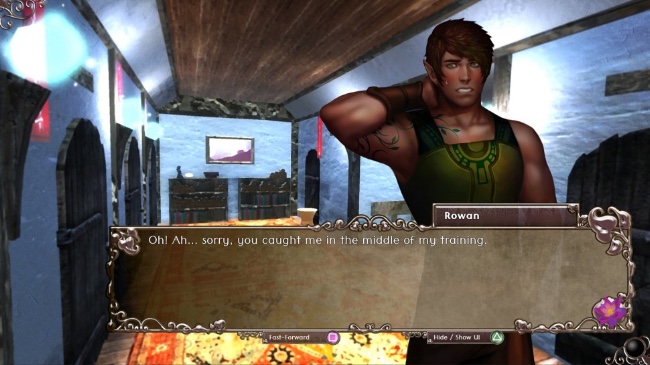
In middle school, Souha Al-Samkari really wanted her own video game console. Up until that point, she’d basically done the beg, borrow, steal thing to get time at friends’ houses or posted up at demos in stores. So when lobbying and begging didn’t work with her parents, she decided she could earn a console.
“I took one of those Olympia Sales Club things home to my parents,” she says. “I said, ‘Look! If I sell, God knows how many, I can get a Nintendo 64!’ They finally just looked at each other, and were like, ‘Oh my God. Fine. We’ll just get you one.’ And that was the greatest day of my life.”
It’s a pretty bold statement to say that getting a Nintendo 64 was the best day of your life, but Al-Samkari is very passionate about video games. She’s the co-founder of indie video game company Truant Pixel, and an avid gamer herself — it’s been a part of her identity for as long as she can remember.
“I have really early memories of typing in a bunch of code to bring a game up on my dad’s Commodore 64,” she says. “So, it was just a really natural part of my life.”
***
Saying that women like to play video games and have always played them (regardless of the stereotypes about what a “typical” gamer looks like), is no longer a statement likely to get a gasp out of the cheap seats. The statistics get brought up often these days. From 2006-2018 women made up 45 percent of gamers. So game developers can’t deny that women play video games and grew up playing them, just like Al-Samkari did. And yet… if you’re not a cisgendered, heterosexual, white male, you’re still far less likely to see yourself reflected in the industry.
“I still don’t feel necessarily seen in the way that I would like,” 31-year-old Al-Samkari says.“You have more visible female characters in games now, but most game protagonists are still white, male, 30s, brown hair. It’s still a lot of the same stuff.”
The number of female video game heroes may not be improving either. Feminist Frequency, an organization that analyzes media’s relationship to gender, race, and sexuality puts out a breakdown every year of the gender roles in video games at E3, one of the biggest video game conventions. Last year, only 8% of the video games featured a woman in the lead role — that’s in comparison to the 24% that featured a male. The rest were games in which you could choose male or female characters or the gender was not specified. And this number, Feminist Frequency says, has been pretty constant — female protagonists have been hovering between 7-9% for the past few years.

Part of the problem with the lack of representation onscreen is that there’s also, a lack of representation in the video game industry as a whole. A recent study from the International Game Developers Association found that only one in four developers identified as female, and, in the same survey, 61 percent were white and 81 percent identified as heterosexual. A UK based group, POC in Play, which works to get more diversity in game development cites even more dismal diversity numbers amongst game developers. A 2015 report showed that only 4% of developers in the country were members of ethnic minorities at the time.
Without as many opportunities for seats at the table, many women and other less represented people in the gaming world want to carve out their own space — making more inclusive work that reflects their interests and experience — along with others who have been marginalized in the industry.
“I seek out spaces with people who are like us,” Al-Samkari says when she goes to conferences and conventions. “Other minority developers, women developers, trans developers — I’m comfortable in spaces like that.”
Of course, starting your own company, like Al-Samkari did, isn’t a simple process. She and her partners work hard, but they also had resources that she is careful to admit many don’t have. There’s a certain level of privilege that she’s quick to cop to. Al-Samkari was working as a lawyer before making the leap to work with Truant Pixel fulltime and her husband, who also is a designer and artist for the company, is still working as a doctor while they get things off the ground.
“It’s tough because in order to create your own spaces or at least in order to create your own company, you have to have resources,” Al-Samkari says. “But women and people of color, and well, anyone who isn’t a cis-white male, most of the time, they don’t have those options. So they end up having to just do what they can with whoever is going to hire them.”

Though it’s got flaws, Al-Samkari believes that the gaming industry is slowly changing to become more inclusive. In the meantime, she’s excited that she has a platform to tell diverse stories — like romance, which has often been mocked in the industry. Truant Pixel is developing a “visual novel” called Akash: Path of the Five, while making themes and diverse avatars for other companies.
“We try to do things that we like,” she says. “Not just things that are cool now. Because in five years they’re not going to be.”
Al-Samkari is working on her own projects too, projects which speak to her interests and aesthetics, all in hopes that the mainstream video games will continue to become more representative of the people who play them. People like her — she’s a fan and gamer after all.
“We’re seeing a lot of women leading in games as far as design, and characters, and narrative,” she says. “I’m hoping that we will continue going down that route because we’re doing better….They know that we’re here, and we’re making some steps, but the industry is not where it should be. It’s great that we’re adding more women, but let’s keep pushing towards more representation.”
